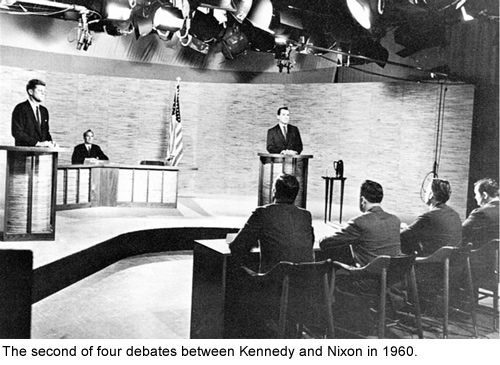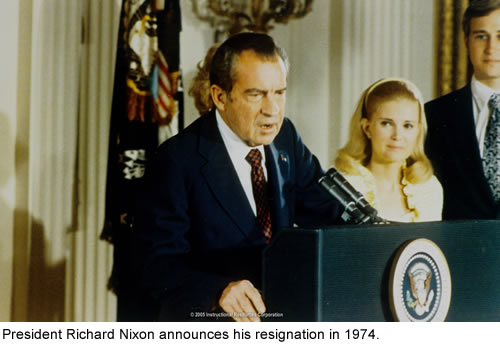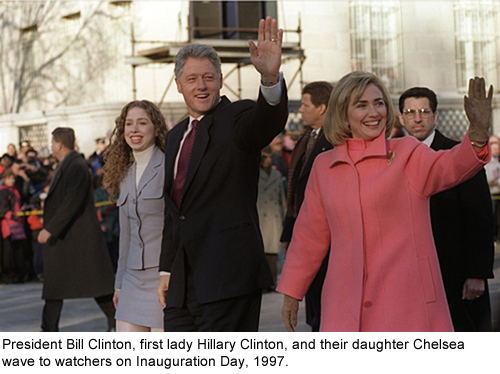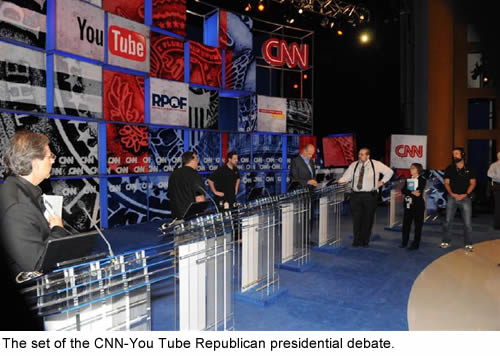Learn
- Media and Politics
- Impact of Television
- Presidents and TV
- 24-Hour News
- Media Bias
- Electronic Media
- Negative Advertising
Impact of Media in Politics
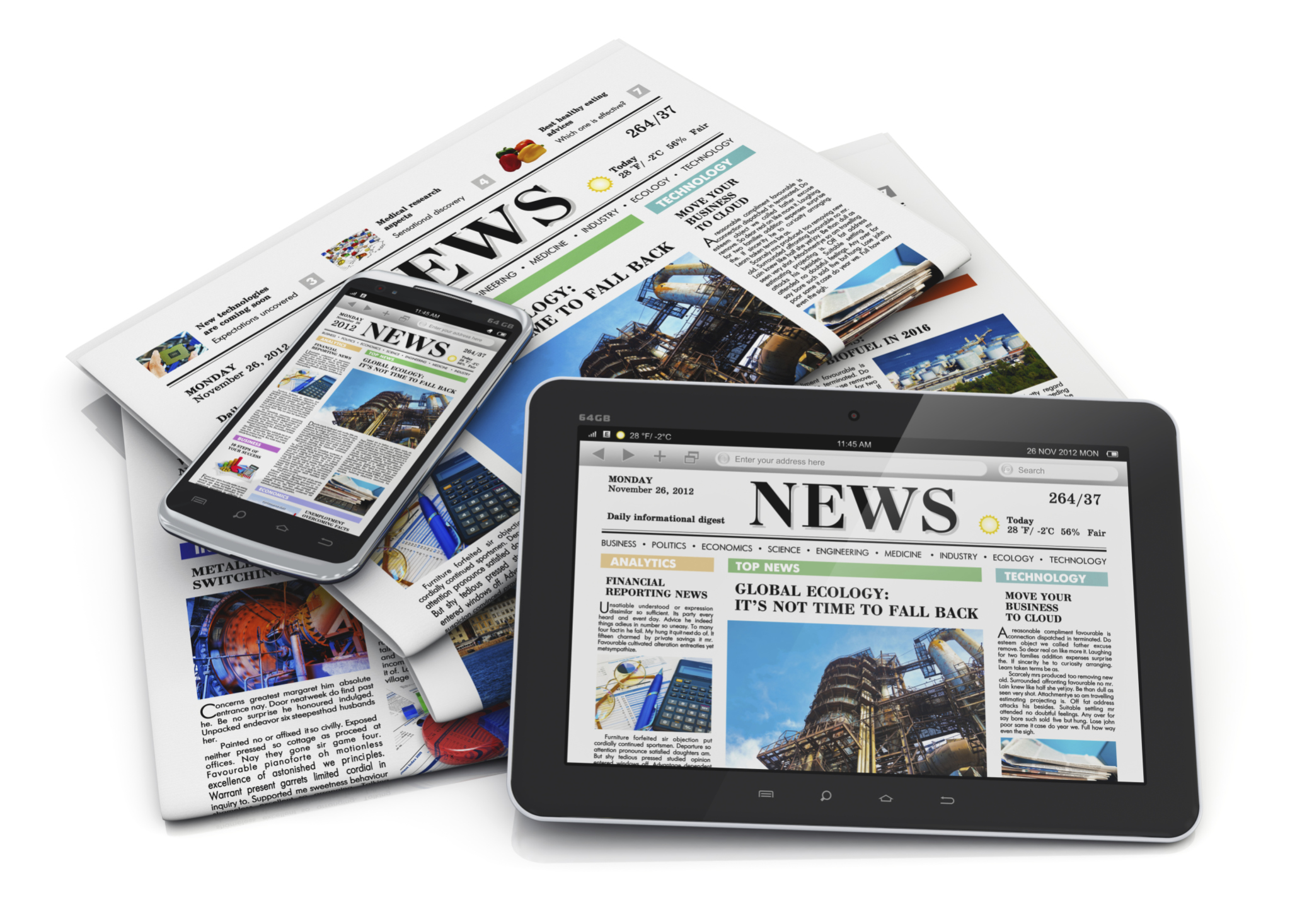
Elections are greatly impacted by mass media coverage. Political events are readily available for viewing by the public. The print media today is facing tremendous pressure. The increasing popularity of the Internet as a news source has caused newspapers and magazines to change their traditional methods of delivering the news. Increasingly, print media is using a hybrid of print and online reporting to deliver the news.
The media are enormously important in American politics today. They perform a number of functions, including:
delivering entertainment
news reporting
identifying public problems
socializing new generations
providing a political forum
making profits
The functions continue to expand in an ever broadening scope. For example, twitter allows news anchors to provide instant updates on certain stories. In recent presidential campaigns, supporters have created their own political advertisements. Using the Internet, ads and response are available to millions within a day.
Read "Political Processes and Television" to learn more about the impact of TV on politics. Complete section one of 8.04 Mass Media and Politics as you read the article.
Kennedy-Nixon Debates
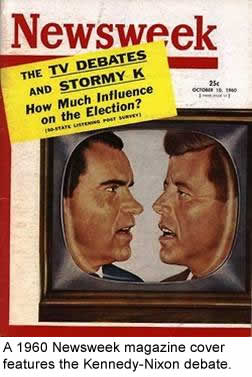
The first campaign that was directly influenced by televised media was the 1960 presidential campaign with candidates Senator John F. Kennedy and Vice President Richard Nixon. Vice President Nixon had served under one of the most popular president of the modern era. Most experts thought he would be a cinch to be elected, but the televised debates changed the momentum in the race. The debates helped the younger and less experienced candidate Senator Kennedy.
Read "History.com: The Kennedy-Nixon Presidential Debates" to learn more about the historical television debates.
Millions of Americans tuned-in to watch the Kennedy-Nixon Debates, the country's first televised presidential debates in 1960. Nixon had experience on his side; however, he did not appear to be the polished "people person" on television like Kennedy. Nixon appeared tired, nervous, and hot in the debates, which greatly impacted public opinion concerning his image in the extremely close election.
Presidents and Television
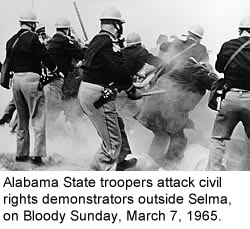
By the mid-1960s, television had assumed an important role in politics. In some cases, television has set the stage for leaders to take quick action. Lyndon Johnson had three screens installed in one room at the White House to allow him to monitor all three major networks, ABC, CBS, and NBC at the same time. Whenever he saw his picture appear, he would immediately turn on the audio of that station to hear what was said. Johnson was watching his triple screen TV when NBC interrupted its airing of "Judgment at Nuremberg" to show footage of the demonstrators in Selma being brutally attacked by police. Sensing public outrage, Johnson very quickly proposed and pushed through the Voting Rights Act of 1965.
Exposing the President
Coverage of a president's personal life was off-limits for years. For example, when a new reporter observed a young woman being escorted into President Kennedy's suite and rushed to tell his editor, the editor replied "You're supposed to report on political and diplomatic policies, not girlfriends. No story."
The events of the Vietnam War and the Watergate Scandal soured the press on government and changed forever the relationship between the press and the president. Today's journalists work in an environment of cynicism, assuming politicians rarely tell the whole story. They often see searching for the truth as their job.
When the Clinton-Lewinski Scandal broke, the entire press-corps reacted with cynicism. The desire to find out what the president had to hide in his private life was so strong that seventy-five percent of the questions at the daily news briefings were about the scandal, not the "real" news of the day. The scandal was revealed by a website called the Drudge Report, owned and operated by Matt Drudge. The site is somewhat like a political tabloid with some factual information and some questionable information.
Many political scientists are critical of investigative journalism, which often pits the press against the elected officials. They cite this as one of the main causes of greater public cynicism and negativity about politics.
Image credit: Richard Nixon Announces is Resignation, 1974. IRC, 2005. [Image].
Cable News Networks
Television has brought immediacy to how we govern, removing the filter of time from events. In the past when major events occurred, government had time to consider in multiple centers of power what should be done. Since the launch of CNN in 1980, 24-hour cable news has reported on major events using live and immediate coverage.
Today, because we see events occurring in "real time," we expect government to respond immediately, even though it was not designed for this very quick turnaround on events. Perhaps the public is more often dissatisfied with government in the television age because of the time it takes for action to occur.
The Election of 2000
The urgency of the 24-hour news cycle and the pressure to be the first network to have breaking news resulted in a rush to judgement in the 2000 presidential election. The election was a tight race between Vice-President Al Gore and Texas Governor George Bush. The election was one of the closest elections in our history. Late in the night, the media called the election for George W. Bush based on their projections and exit polls. As a result, Vice-President Gore conceded the election and later recalled his concession, setting the stage for one of the most famous political battles in our nation's history.
Read about the role the media played in the election at "The New York Times: Media Rethink Urge to Say Who's First". Complete section one of 8.04 Mass Media and Politics as you read the article.
Media Bias
One of the most common complaints about the media is the influence the media can have on the political races. Many supporters complain that their candidates receive coverage from the media that is bias. In addition, a third party candidate has very little chance to raise money and gain exposure due to the lack of media spotlight.
The yellow journalism trend of neglecting ethics in order to make money has slowly crept back into the media. With the rise of media conglomerates, some television news shows have become highly opinionated and lacking in fairness. Media outlets own the most influential newspapers, magazines, and television shows. Did you ever notice that most news networks report on many of the same stories? They can filter out any news they do not want to report.
Read "Winning the Media Campaign: How the Press Reported the 2008 General Election" about media bias in the 2008 election. While you read the article, complete section four of 8.04 Mass Media and Politics.
Media Coverage
News coverage of political candidates has become increasingly less favorable. Thomas Patterson's Analysis of Presidential Media Coverage since 1960 revealed the following facts about Time and Newsweek stories:
1960 - Favorable references about Kennedy and Nixon outnumbered unfavorable ones by a three-to-one margin.
1992 - There were three negative references regarding Clinton and Bush for every two favorable references.
The emphasis of campaign reporting has changed from "what" to "why." Interpretative stories abound that contain hard-biting analysis of political maneuvering and the "horse race." In other words coverage has shifted from policy statements to campaign controversies and who is winning the race. For example, in the 2000 presidential election, the media heavily focused on stories like Al Gore's fundraising at a Buddhist Temple in 1996 and George W. Bush's arrest for driving under the influence of alcohol.
Electronic Media

The role of the traditional media is changing as electronic media play an increasingly larger role in the daily lives of Americans. Electronic media officially include any media that use electronics. However, we generally refer to electronic media as sources using computer-age technology and the Internet. With news stories available from all over the world, users can select what is important and what is not important to them. A single entity, like a television network, no longer has the control over news that it once had.
Increasingly, Americans are turning to electronic media for their news. Studies have shown than young people are very likely to use social media to express views on social issues. Electronic media provides ready access to fast-breaking news reports.
Read "The Internet in Politics" to learn more about the impact of the internet.
Negative Advertising
Since 1952, campaigns have included televised campaign ads. In the beginning, most of them were ads supporting one candidate, usually highlighting his or her character and good deeds. More recently, ads have taken on a more negative tone, often attacking the opposing candidate with misleading information. Attack ads today can come from many sources including television and the Internet.
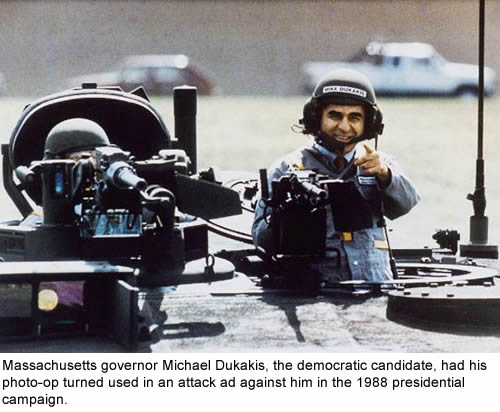
Attack Advertisements
What impact do attack ads have on the electorate? Do they appeal to the voters' interest in the election or create more cynicism and distrust in government?
Watch the following political ads to decide for yourself:
Whatever it Takes (1:00)
Yes We Can (4:25)
Obama Love 10 (2:56)
Windsurfing (:31)
Peace Little Girl (Daisy) (1:00)
Willie Horton (:33)
Tank Ride (:30)
Bear (:30)
Complete 8.04 Political Campaign Ads as you watch the ads.
